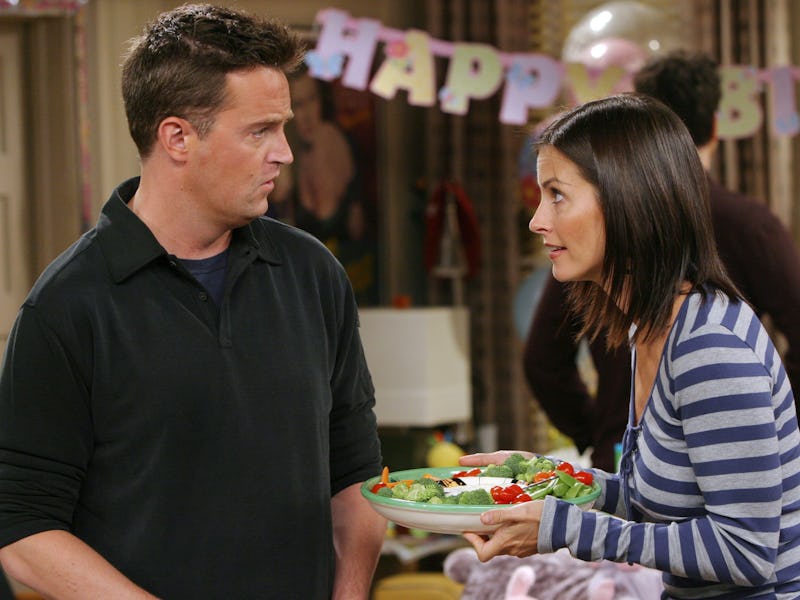Why scientists say this person could be the love of your life
New results challenge outdated, dominant narratives about romantic relationships.

In one episode of Friends, Joey decides he wants to be in a long-term relationship.
He’s jealous of Monica and Chandler's serious relationship, so he goes to Monica for advice. She suggests that she and Chandler work so well because they were friends first —maybe he should try that. In a classic Joey interpretation, he takes this to mean he should hit on his existing female friends.
In an age of dating apps, it can seem like Monica’s advice is outdated as a flip phone. But according to social psychologists, she was right. A study published Monday in the journal Social Psychological and Personality Science found that roughly two-thirds of romantic relationships begin as platonic friendships.
Co-author Danu Anthony Stinson is an associate professor of Psychology at the University of Victoria. Stinson tells Inverse these results challenge outdated, dominant narratives about romantic relationships and reflect a more accurate reality.
“In our culture, we have these very clear scripts about how romantic relationships start,” she says. “Those scripts are dominated by sexist and outdated ideas about gender and roles that people are supposed to play in relationships, as well as what they desire in relationships.”
In reality, the lines between friendship and romance are often blurry — and if the scales tip toward love, Stinson’s research suggests this can make lasting relationships.
How the discovery was made — Stinson and colleagues first reviewed a sample of previous studies about how romantic relationships begin. They found that nearly 75 percent of studies of those studies focused on a romantic spark between strangers. Only eight percent focused on friendships that later develop into romances.
They then performed a meta-analysis of seven studies they conducted in their labs. In total, 1,900 participants, a mix of university students and crowdsourced participants, indicated if they were friends with their “current or former romantic partner before they become romantically involved.”
What’s new — Sixty-six percent of respondents (a little more than two-thirds) said they had been friends with their current or most recent romantic partner before becoming romantically involved.
This varied slightly among age, gender, and ethnic demographics. The most pronounced variation was among people in the LGBTQ+ community and 20-somethings; nearly 85 percent of respondents representing both groups were likely to have friends-first romantic relationships.
Nearly half of the students reported that their preferred way of developing a romantic relationship was by being friends first. This far surpassed other options like dating apps.
A couple flirts at a diner in New York City.
Notably, 20-somethings and people in the LGBTQ+ community are often associated with using datings apps — something that seems the very definition of dating initiated romance. To Stinson, this finding suggests a few possibilities.
“It is possible people are finding friends on these apps who they later develop relationships with,” she says. “But certainly it raises questions about what the purpose of those apps are and what people are using them for.” (Sex.)
Among university students, "friends-first initiators" were friends for one-to-two years before beginning a romantic relationship.
Stinson says this length of pre-romance friendships means it is likely that the couples were genuine, platonic friends before transitioning to romance. Indeed, most of these participants reported they did not enter their friendships with romantic intentions or attraction.
Is it actually possible to be “just friends”?
Skeptics might assert that some of these people entered into friendships with people to whom they were attracted in hopes of a romantic relationship developing. Still, the researchers saw little sign of this in the data.
Among the university students who ended up in romantic relationships with friends, participants had been friends with the person for one to two years before becoming romantically involved. That’s a long time to wait if your sole motivation is romance.
In some cases, the researchers found that good old “friends with benefits” scenarios, in which friends also have a sexual relationship, turned into romantic relationships.
However, research suggests younger people who are most likely to have friends with benefits relationships are among the least likely to have romantic relationships result from them. For what it’s worth, Stinson found “nearly 30 percent of the married people who had friends first initiation relationships say those relationships did start as friends with benefits.”
What’s next — Stinson and colleagues now want to understand further how people in friends-first relationships define friendship and how the relationships became romantic.
“One of the things we want to know is how the transitions actually happen,” she says.
“What is it that sparks the feelings of romance in what had previously been a platonic relationship? Why do it years in and not earlier? I’m also really interested in answering the question of how people choose whether to act on those feelings or not.”
Abstract: There is more than one pathway to romance, but relationship science does not reflect this reality. Our research reveals that relationship initiation studies published in popular journals (Study 1) and cited in popular textbooks (Study 2) overwhelmingly focus on romance that sparks between strangers and largely overlook romance that develops between friends. This limited focus might be justified if friends-first initiation was rare or undesirable, but our research reveals the opposite. In a meta-analysis of seven samples of university students and crowdsourced adults (Study 3; N 1⁄4 1,897), two thirds reported friends-first initiation, and friends-first initiation was the preferred method of initiation among university students (Study 4). These studies affirm that friends-first initiation is a prevalent and preferred method of romantic relationship initiation that has been overlooked by relationship science. We discuss possible reasons for this oversight and consider the implications for dominant theories of relationship initiation.
This article was originally published on